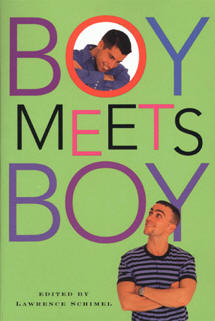 |


|
|
Boy Meets Boy , edited by Lawrence Schimel; St. Martin's Griffin, 196 pages; $12.95.  Lawrence Schimel is a prolific wordsmith who in his 27 years
has written or edited 27 books. Boy Meets Boy, edited by Mr. Schimel, is a
"collection of observations, anecdotes, essays, wishful thinking and
out-and-out lies [which] celebrates and bemoans all the experiences that
collectively compose that mixed blessing called 'dating.'"
Lawrence Schimel is a prolific wordsmith who in his 27 years
has written or edited 27 books. Boy Meets Boy, edited by Mr. Schimel, is a
"collection of observations, anecdotes, essays, wishful thinking and
out-and-out lies [which] celebrates and bemoans all the experiences that
collectively compose that mixed blessing called 'dating.'"
Where some gay men might view dating as the two or three hours before sex, others date in order to find that elusive Mr. Right. (Federal agents reading this review should note that the word "boy" does not refer to underage males. Rather, "boy" is the endearing term that gay men this side of 50 use to refer to one another, as in "I met this cute boy at the O'Zone last week! Unfortunately, he still lives with his parents in Hialeah.") Since I haven't done any dating since 1985 (my lover would kill me), I have no recent personal experience on the subject. But men have been dating each other long before AIDS made it a crucial matter, even when most guys didn't wait until the third date to jump in bed. Everyone has a dating story to tell, though not everyone has the literary skills to put that story on paper or between the covers of a book. Many of those gifted recounteurs are represented on the pages of Boy Meets Boy. "Boy Meets Boy tells the stories of some memorable dating moments in the lives of an array of different gay men--some of whom write habitually and others for whom this is their first publication." Schimel's editing skills are top-notch; and there are very few clunkers in this collection. On the other hand, some of the essays are quite good, particularly those written by Jameson Currier, D. Travers Scott, Michael Lassell and Schimel himself. But even the worst essays are worth reading, for they provide new perspectives - however misguided - on the joys and oys of gay dating. Read Boy Meets Boy before you go out on a date. And then write your own story. Brief Views. With 1999 rapidly receding in our memories, the time has come to catch up on some of last year's more memorable publications. Two first-time novels deserve our attention. Lucifer Rising by Sharon Bowers (Justice House Publishing; $16.99) is "a novel about love and fear" set in Miami. More precisely, it is the story of Jude Lucien, "agent-turned-drug-dealer" and Liz Gardener, the Miami Herald reporter sent to cover her story. As usually happens in such situations, the two women fall in love, but not before going through a series of life-threatening experiences we expect to read about in a thriller. Those who buy Lucifer Rising expecting an exciting adventure will not be disappointed. Those who expect a touching lesbian love story will not be disappointed, either.
The most enduring gay publication in history was Der Kreis (The Circle). Published in Zurich, Switzerland, the trilingual (German, French and English) Kreis appeared, in various incarnations, continually from 1932 to 1967, providing the missing link between the pre-Nazi homosexual emancipation movement and the modern gay liberation movement in both Europe and America. In The Ideal Gay Man: The Story of Der Kreis (Harrington Park Press; $17.95), Hubert Kennedy tells the unjustly untold story of this pioneering gay publication and of Karl "Rolf" Meier, the former actor who edited Der Kreis. Rolf used Der Kreis as a pulpit, to preach his view of "the ideal gay man". He also provided a forum for gay writers from both sides of the Atlantic (like James Barr and Samuel "Phil Andros" Steward) and, more importantly, kept the gay spirit shining through a couple of bleak decades. Kennedy's excellent history, based on copies of Der Kreis that Steward bequeathed to the Center for Research and Education in Sexuality (CERES) in San Francisco, should give Der Kreis the recognition it so richly deserves. |
 © 1997-2000 BEI
© 1997-2000 BEI